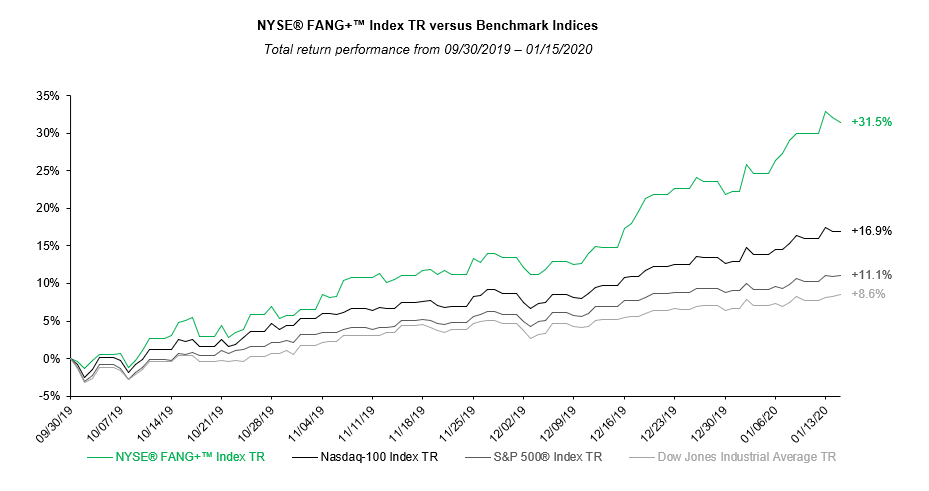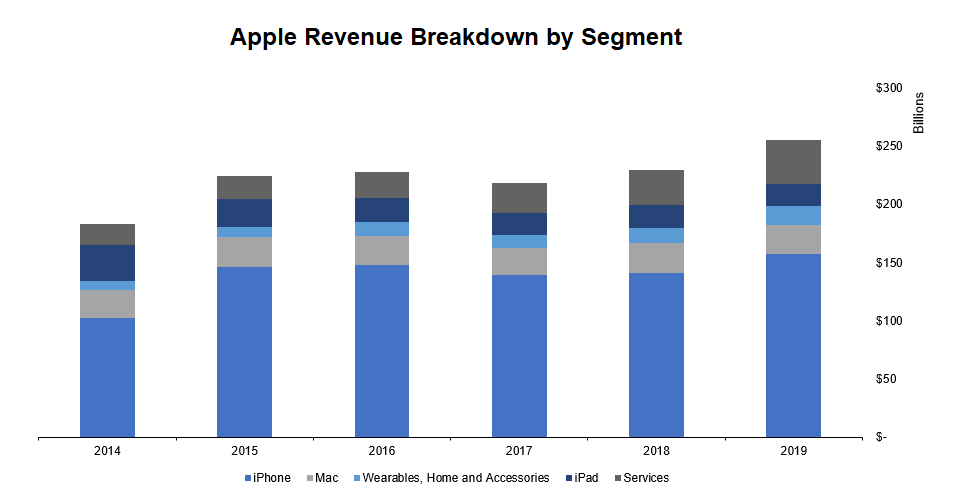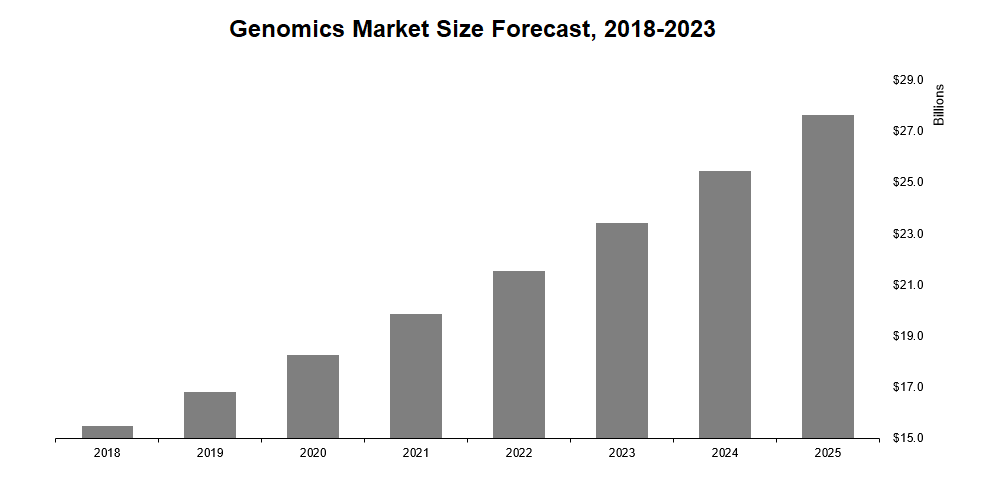Themes In Big Tech: Healthcare
The market is off to a strong start in 2020 with FANG+ constituents helping to lead the way. The NYSE FANG+ Index leads broad market and tech benchmarks alike trading +7.5% YTD and +31.5% since the start of 4Q19.
(Click on image to enlarge)

Source: Bloomberg
Heading into Q4 earnings, we’ll be following healthcare adoption amongst Big Tech players like Apple, Amazon, and Google. These FANG+ names are innovating across smart technology, cloud computing, health insurance, and supply chain logistics. We believe there will be many headlines regarding FANG+ and healthcare in 2020 and beyond.
Wearable Tech & Smart Home:
Roughly 1 in 5 American consumers used wearable or smart home technology in 2019 according to data compiled by S&P Global. These figures, up +4% and +3% YoY respectively, are expected to reach 30% by 2023. Wearable products include fitness trackers, smartwatches, smart glasses, listening devices, and other clothing accessories. Smart home tech ranges from lighting fixtures to security and smart locks.
(Click on image to enlarge)
.png)
Sources: Industry data; Kagan estimates
Apple:
Apple CEO Tim Cook has placed an emphasis on changing the medical industry–even saying it will be Apple’s “greatest contribution to mankind.” The company has developed electrocardiogram-equipped Apple Watches, apps to enroll people in medical research studies, and software kits to make it easier for health developers to leverage health data.
(Click on image to enlarge)

Source: Bloomberg, Company filings
Amazon:
In 2019, Amazon announced that its voice assistant, Alexa, became HIPAA complainant. As a result, Alexa can send and receive protected health information. Various health systems including Express Scripts, Cigna Health, Boston Children’s Hospital, Atrium Health, Providence St. Joseph Health, and Livongo signed on immediately.
Google:
In early November, Google announced that it would buy Fitbit for $2.1 billion. Fitbit will provide the search giant with more exposure to the healthcare space by furthering Google’s health tracking platform, Google Fit. Fitbit has been utilizing Google Cloud for its devices since mid-2018.
Cloud Computing, AI & Machine Learning:
Cloud computing, along with other technological advancements, has played a major role in modern genomics. Scientists in the ‘90s resorted to shipping disks and thumb drives by mail or hand due to the slow speed of data transmission. Now, raw DNA data can be uploaded and distributed through cloud services. Additionally, cloud-based solutions dramatically reduce the time required to analyze massive datasets. The global genomics market forecasted to grow to $27.6 billion globally by 2025, has been a natural focus for Amazon and Google.
(Click on image to enlarge)

Source: Grand View Research
Amazon:
Amazon Web Services (AWS), the cloud computing arm and core profit-generating business segment of Amazon, has been an extremely critical component to the company in recent years. AWS’s data storage and machine learning offerings are being utilized to advance innovation across the healthcare sector. Grail, one of Amazon’s most ambitious investments, is looking to use deep sequencing technology to detect the earliest signs of cancer in the blood, while it’s still treatable. AWS assists the data processing and storage aspects of this goal.
The National Football League (NFL) recently announced it will deepen its partnership with AWS to mitigate player health risks. According to an Amazon press release, the partnership will collectively “develop new tools and generate deeper and better-informed insights into player injuries, specifically the impact of a variety of factors such as game rules, equipment, and rehabilitation and recovery strategies.”
Google:
In November 2019, Alphabet’s Google signed its largest cloud customer in the healthcare sector to date. Ascension, operating 150 hospitals and over 50 senior living facilities, will move some of its data and analytic tools to Google servers. Alphabet, arguably one of the world’s largest data collectors, will gain access to the personal health information of millions of Americans across 21 states.
General Healthcare & Wellness:
Amazon:
Amazon recently rolled out Amazon Care–a virtual primary care clinic with an option for in-home follow-ups. The program is currently being piloted by Amazon employees and their families in the Seattle area and is part of a larger effort to improve the quality of healthcare while minimizing costs for employees. If successful, Amazon Care could likely be replicated across Amazon’s “Haven” partnership with J.P. Morgan and Berkshire Hathaway. The three companies joined together in 2018 to leverage cloud computing and artificial intelligence to improve healthcare and ultimately drive down costs. Collectively, 1.2 million employees are covered by Haven and this reflects a fraction of Amazon’s addressable market of over 100 million prime memberships across the world”
Google:
Verily, Alphabet’s primary healthcare business is a research organization that spun out of Google X labs. The group has a range of focuses from medical devices to health systems–making headlines for the later back in October 2019. Verily announced a partnership with Atrius Health and Palo Alto Veteran Affairs to move from fee-for-service models to systems that encourage patient wellness.
Supply Chain:
Unlike other sectors, the supply chain in healthcare is very complex and fragmented. This is the result of logistical and regulatory hurdles. In many cases obtaining resources, managing supplies, and delivering medical products means going through manufacturers, insurances companies, hospitals, providers, or regulatory agencies.
Amazon:
Amazon aims to make waves in this space through its recent purchase of PillPack. PillPack is an internet pharmacy that specializes in packaging and delivering prescription drugs directly to the home. Amazon expects to scale this “direct deal” service through its existing distribution and logistics network. Big insurers like Blue Cross Blue Shield of Massachusetts have already signed on for integration.
More FANG+ News in Healthcare:
The Healthcare sector is facing disruption from non-traditional players. Ranging from heart monitors to drug prescription delivery – FANG+ names have been a driving force in health innovation.
Facebook: virtual reality device Oculus has been utilized to simulate pediatric emergencies to train doctors and medical students.
Nvidia: in many cases, artificial intelligence (AI) used in healthcare/medical services run on Nvidia GPUs. This includes the advanced DNA sequencing utilized in modern genomics.
Alibaba: in mid-2019 Alibaba bought nearly $290 million worth of shares of its subsidiary Alibaba Health – which focuses on integrated healthcare information and providing content services. The move marks Baba’s latest push into China’s healthcare sector.
Baidu: using their open-source blockchain platform XuperChain, China’s second-largest search engine aims to store health records including diagnostics, treatments, and prescriptions.
Disclaimer: For Institutional use only, this is not intended for retail investors, public viewing or distribution.
Past performance is no guarantee of future returns. The opinions and ...
more


